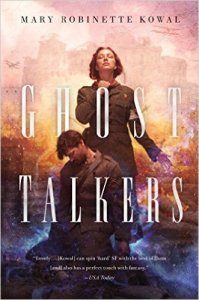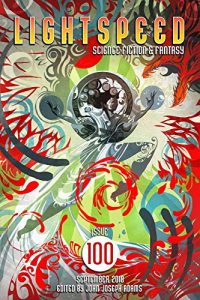Paul Di Filippo reviews Lois McMaster Bujold
 My only refuge at this point from charges of dereliction of duty and critical malfeasance is a famous statement made by Thomas Pynchon in the foreword to his collection Slow Learner: “Ignorance is not just a blank space on a person’s mental map. It has contours and coherence, and for all I know rules of operation as well. So as a corollary to [the advice of] writing about what we know, maybe we should add getting familiar with our ignorance, and the possibilities therein for writing a good story.” Yeah, that’s the ticket! All this time I’ve been blithely reviewing while never having read a single book by Lois McMaster Bujold, I was just farming some nebulous acreage in my kingdoms of ignorance, hoping for a good crop of—what exactly?
My only refuge at this point from charges of dereliction of duty and critical malfeasance is a famous statement made by Thomas Pynchon in the foreword to his collection Slow Learner: “Ignorance is not just a blank space on a person’s mental map. It has contours and coherence, and for all I know rules of operation as well. So as a corollary to [the advice of] writing about what we know, maybe we should add getting familiar with our ignorance, and the possibilities therein for writing a good story.” Yeah, that’s the ticket! All this time I’ve been blithely reviewing while never having read a single book by Lois McMaster Bujold, I was just farming some nebulous acreage in my kingdoms of ignorance, hoping for a good crop of—what exactly?
Well, at least my utter non-acquaintance with Bujold’s award-winning Vorkosigan Saga over the twenty-five years of its existence is a “known unknown,” to quote a former Secretary of Defense. Aware of my lacuna, I am able to remedy it by plunging, a pure newbie, into her latest installment. Please accept all my reactions and insights as deriving from such a benighted creature. Thank God for Wikipedia!
My first pleasant impression upon being introduced to Captain Ivan Vorpatril, on assignment in the domed city of Solstice on the planet Komarr, newly integrated part of the Barrayaran Imperium, is that somehow Poul Anderson had returned from beyond Death’s Door, rendered noticeably less bardic by the afterlife, to provide another charming adventure in the career of Sir Dominic Flandry. Being steeped also in similar work by Harry Harrison, Keith Laumer, Christopher Anvil, James Schmitz, and Gordon Dickson, I felt instantly at home in a familiar scenario always pregnant with tragicomic cloak-and-dagger possibilities. (But of course, doing my Wikipedia browsing, I find that other entries in the Saga aim for different and often more sober effects.) With the arrival of two enigmatic and beautiful women on the run, Rish and Tej (charmingly illustrated by David Seeley on the back cover), the literary territory solidified even further.
By the way: one immediate benefit of my ignorance-shattering reading was that after encountering the word “Barryaran” often enough in its native context, I was able to rid my mind of a nervous tic. For decades previously, the sight of that word immediately made me think of 1) Barry Longyear; and 2) the particle from physics called a baryon. Now that reflex is gone.
Quickly and amusingly, the game being played by Captain Ivan Vorpatril moved into slightly Frank Herbert-ish territory, with some Dune-style dynastic doings. Tej turns out to be someone very important. Soon, the fates of the two refugee women are inextricably tied to Vorpatril and his official duties, in an intriguing and amusing fashion. When all three return to Barrayar, cultural and social misunderstandings and embarrassments proliferate, especially when some of Tej’s family show up. (Miles Vorkosigan, more famous relative to Ivan, makes a cameo.) An action-packed climax resolves with Ivan Vorpatril and Tej on a new conjoined course.
The central bulk of Bujold’s tale, bookended by the more actionful sequences, struck me as very much a Gilbert & Sullivan farce. Or perhaps one of those romantic comedies where Jean Arthur torments Cary Grant, or Sophia Loren discomfits Marcello Mastroianni. This was surprising to me. I had envisioned these books as all dartings-to-and-fro across a broad interstellar canvas, full of blood and thunder. Perhaps others in the sequence actually are like this. But the current volume under inspection reminded me of a C.J. Cherryh novel, where decorum and politesse weigh just as heavily as fleets of rampaging starships—except Bujold’s version is lighthearted and absurd, not grim and fetishistic. A romp, in other words. This amount of sheer silly fun must partly explain Bujold’s allure, as does her transparent prose and deft sliding from one viewpoint to another.
In fact, I can now easily see why Bujold’s books are so popular. They live at the still-beating eternal heart of science fiction, Campbellian space opera. Nothing here would be unknown to those writers cited earlier, or to Asimov or even to the Ace Double back-to-back team of young John Brunner and Robert Silverberg. Populated with vivid characters; using settings that mildly tweak the conventions of the mode without being transgressive, revolutionary, or avant garde; smoothly written and upbeat, such novels fulfill a readerly set of desires not satisfied by more challenging New Space Opera from such innovators as M. John Harrison and Alastair Reynolds. But Old Space Opera was not rendered passé by the advent of its younger scion, any more than Dave Brubeck was rendered “unlistenable” by the arrival of the Beatles. So long as the subgenre is handled with brio and craft, such as Bujold supplies, it will provide plenty of treats for those fans eager to explore the spaceways with knights of ghosts and shadows.










Thanks for the review.
At last, I’m actually convinced to read some of this series.
A useful review. I’ve been reading sf for 63+ years, & of the current crop
I like only Bujold & Stirling. You’ve got a great experience to come. BTW,
C. V’s Alliance, the last of the Vokosiverse books, is a poor beginning to the series. An old LMB fan like me can reread the internal summary of the series (with pleasure) but it risks spoilage.
LMB herself recommends internal chronological order.